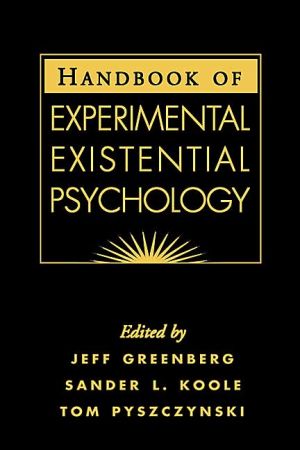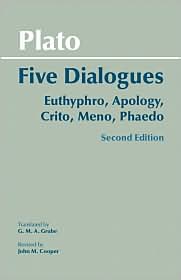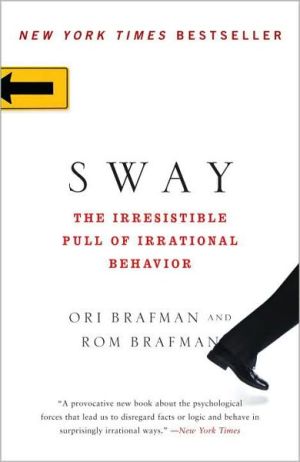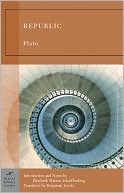Handbook of Experimental Existential Psychology
Social and personality psychologists traditionally have focused their attention on the most basic building blocks of human thought and behavior, while existential psychologists pursued broader, more abstract questions regarding the nature of existence and the meaning of life. This volume bridges this longstanding divide by demonstrating how rigorous experimental methods can be applied to understanding key existential concerns, including death, uncertainty, identity, meaning, morality,...
Search in google:
Social and personality psychologists traditionally have focused their attention on the most basic building blocks of human thought and behavior, while existential psychologists pursued broader, more abstract questions regarding the nature of existence and the meaning of life. This volume bridges this longstanding divide by demonstrating how rigorous experimental methods can be applied to understanding key existential concerns, including death, uncertainty, identity, meaning, morality, isolation, determinism, and freedom. Bringing together leading scholars and investigators, the Handbook presents the influential theories and research findings that collectively are helping to define the emerging field of experimental existential psychology.
Handbook of Experimental Existential Psychology\ \ The Guilford Press\ Copyright © 2004 The Guilford Press\ All right reserved.\ ISBN: 1-59385-040-9 \ \ \ Chapter One\ Being Here Now\ Is Consciousness Necessary for Human Freedom?\ John A. Bargh\ I do not think, therefore I am. -Jean Cocteau\ Although Socrates claimed that the unexamined life was not worth living, the examined life isn't any picnic either. Facing our mortality and the reality and meaning of our existence head on is not something that we generally enjoy doing. To the contrary, we are all quite resourceful in finding ways to avoid any thoughts about such topics (e.g., Becker, 1973; Solomon, Greenberg, & Pyszczynski, 1991, Chapter 2, this volume). And with good reason: Being more honest about the reality of one's life situation is linked to a greater likelihood of depression and suicide (e.g., Alloy & Abramson, 1979; Taylor, 1989). The honestly examined life, therefore, tends to be a pretty scary place.\ It is somewhat paradoxical that among all of the earth's creatures, humans are superior both in the ability to recognize and ponder our own mortality and in the capability for mentally transforming our worlds to avoid thinking about it. The ability to detach oneself from the direct control and influences of one's current environment depends crucially on our capacity for mentally transforming and construing that environment (e.g., Mischel, 1973; Mischel, Cantor, & Feldman,1996). These cognitive transformations enable us both to act when the current situation is unsupportive of that action (such as through a newfound belief in efficacy and agency within that situation; Bandura, 1986; Yalom, 1980) and to not act in the presence of "hot" situational triggers to action (such as when we delay immediate gratification in the service of more substantial and important long-term goals; Metcalfe & Mischel, 1999). Living thus a layer or two detached from the realities of our present situation also permits the operation of comforting "positive illusions" as to the true state of affairs (Murray, Holmes, & Griffin, 1996; Taylor, 1989) so that, like the children of Lake Wobegon, we can all be "better than average" on every dimension.\ One such positive illusion-the feeling of control, of personal ownership or responsibility for one's own actions and their consequences (e.g., Langer, 1975)-has powerful social benefits as well. As Prinz (1997) and Bargh (1999) have argued, even if volitional states are determined, people behaving as if they have free will and are personally accountable for their actions is of tremendous, even essential, value for the functioning of modern societies. The personal belief in one's own agency has the consequence of infusing one's behavioral options with the normative expectations and guidelines of society at large. The knowledge (or threat) that one will be held accountable by others causes those norms to become very real constraints on one's actions.\ The ability to detach our conscious mind from the mundane concerns of the present brings other tremendous advantages to the individual, such as the contemplation at leisure of past events so as to better understand their meaning, causes, and consequences (as Socrates had recommended), as well as the anticipation of and planning for future events (see Gollwitzer, 1999). Heidegger (1927/1962) emphasized this "time-traveling" quality of conscious experience; for him, existence or "Being" was, paradoxically, permeated by non-Being: "the no-longer (Past) and the not-yet (Future) that hold such power and influence over our thoughts and concerns and emotions" (Barrett, 1958, p. 226). A half-century later, Ram Dass (1971) famously urged us to "Be here now," precisely because we usually are not.\ However, while we are away time traveling, somebody had better be home minding the store. Regardless of where in time and space our conscious mind is currently focused, we are stuck living in the present, with the strong and continuous need to respond adaptively and sensibly to those present circumstances (see Bargh, 1997). To free the conscious mind to reminisce about the past and to plan for the future, the nonconscious self-regulatory processes to be described in this chapter must be capable of handling the demands of the present. This strongly suggests that deliberate, conscious choice processes are not a necessary element of mundane functioning in the here and now.\ CONSCIOUSNESS AND NONCONSCIOUSNESS IN EXISTENTIAL THOUGHT\ However, existential philosophers have reified (some might even say deified) the role of deliberate, conscious choice in everyday life as the sine qua non of existence-the choices we make, or fail to make, are said to give life its meaning and define who we are as individuals. For Sartre (e.g., 1944), consciousness and freedom were one and the same thing (Barrett, 1958, p. 256). Existential philosophy has had a tremendous impact on contemporary psychology, especially through the humanist tradition which placed conscious choice as central and necessary to nearly all human behavior and judgment (see Bandura, 1986; Mischel et al., 1996; review in Bargh & Ferguson, 2000). In this approach, human freedom is pitted against direct environmental causes or influences on one's behavior such as external coercion and force (whether implied or actual), and gratifying short-term pleasures such as tasty desserts or cigarettes, the consumption of which defeat one's long-term goals. The emphasis on transcending or overcoming environmental control can also be seen as a reaction to the dominance of behaviorism-especially radical behaviorism-within experimental psychology for much of the 20th century (see Bargh & Ferguson, 2000), because behaviorism stressed the role of environmental causes to the exclusion of all others.\ Because it equated freedom with conscious choice, existential philosophy was in fact antagonistic toward any conception of human nature in which people were said to be controlled by nonconscious forces. Thus, Sartre (for one) was strongly opposed to the idea of a hypothetical (Freudian) unconscious calling the shots (Barrett, 1958, pp. 254-255), just as he was to the Skinnerian notion of complete environmental hegemony. Sartre and other existential writers (such as Otto Rank) recoiled against any deterministic approach to the human mind, because they felt it let people off the hook too easily regarding the consequences of their actions.\ One should keep in mind, however, that all three of these models of human nature-behaviorist, Freudian, and existential/humanist-take rather extreme positions by positing a single dominant cause of human behavior and higher mental processes to the exclusion of any others. The behaviorist stresses the role of the immediate environment, the Freudian the person's unconscious drives and wishes, the humanist the individual's conscious intentions and choice. When, half a century ago, the existentialists/humanists championed the causal importance of conscious choice (Kelly, 1955, Maslow, 1962; Rotter, 1954), they were reacting to the then-dominant behaviorist and psychodynamic conceptions of man. Given this context it is understandable that they pushed their own causal model as hard as they could, in order to best emphasize the importance of conscious choice as opposed to determining unconscious forces or environmental stimuli.\ Historically, however, staked-out philosophical stances such as these have had two different, and often conflicting purposes, which need to be carefully distinguished. Both of these purposes in fact date back to the early Greek philosophers. One is a practical or utilitarian form, a "philosophy of life" that provides guidelines and rules for conduct and right living; the classic examples of this were the Stoics and Epicureans (Gottlieb, 2000). Barrett (1958) argued that prior to the advent of academic philosophy, philosophers lived their own lives fully in accord with their deeply held beliefs. Kierkegaard, for example, eschewed a happy domestic life with his beloved because it would interfere with his quest to find God. Sartre's insistence on personal freedom and responsibility is the modern exemplar of this kind of philosophy. Accordingly, existentialism lends itself quite readily to use as a therapeutic method, exhorting individuals against fatalistic acceptance of their lot in life and motivating them to take action to change it if necessary (Rank, 1930/1998; Yalom, 1980).\ The other historical purpose of philosophy is to use logic and reason to better understand the universe and how it works, including of course the underlying mechanisms of human judgment and action. More than anyone else, Aristotle is associated with this "scientific" vein of philosophy. It is the stream of philosophical inquiry out of which every modern scientific discipline developed (Gottlieb, 2000)-including, most recently, psychology.\ It is notable therefore that the more scientific and empirical of the existential writers, such as Jung (e.g., 1919), gave greater emphasis to the role of unconscious influences in everyday life than did the more practically and phenomenologically oriented existentialists such as Sartre. Let us say then that whereas existential psychology as a whole recognizes the reality of unconscious psychological processes, it chooses to emphasize conscious and intentional processes for the sake of the greater social good.\ The modern notion of unconscious psychological phenomena-as in mental processes operating outside conscious awareness and often without conscious intent-has more in common with the mechanistic approach of the behaviorists than the dynamic approach of the Freudians. Today's unconscious is no longer only a hypothetical Freudian construct but an empirically established reality embedded in mainstream cognitive psychological theory (e.g., Hassin, Uleman, & Bargh, 2004; Kihlstrom, 1987). Mainly because of its roots in artificial intelligence research (among others), in which it was not possible or even plausible to posit intervening deliberate conscious choice processes, cognitive psychology is entirely comfortable with the idea of nonconscious mental and behavioral processes (e.g., Barsalou, 1992). And if the process could not be instigated by acts of free will or conscious choice in these models, then the cause had to be external to the individual (i.e., in his or her environment).\ The positing of such environmental causation, however, harkens back to the stimulus-response (S-R) psychology of the behaviorists, which failed as an exclusive and all-encompassing account of human behavior (see Chomsky, 1959; Skinner, 1957). The contemporary theoretical solution to this difficulty has been to permit (as the behaviorists adamantly did not) these external causes to operate in combination with internal psychological mechanisms, such as perceptual, motivational, and behavioral constructs. The external situation or setting activates and puts into motion these internal psychological processes, which then operate in complex interaction with events and stimuli in the outside world-often over extended periods of time, unlike the old S-R psychology. Once activated, these systems operate outside conscious awareness and guidance. This model of human judgment and behavior, in which aware and intentional conscious choice is not a necessary component, has been found to have considerable predictive and explanatory power (Bargh & Ferguson, 2000; Ouellette & Wood, 1998).\ CONSCIOUS CHOICE IS NOT ESSENTIAL TO EVERYDAY LIFE\ With time and experience, behaviors and decisions that once required a good deal of conscious thought and monitoring no longer do so; they become more efficient in their use of limited attention, and more routinized so that we no longer have to make choices and decisions every step of the way (Bargh & Chartrand, 1999). As William James (1890) put it, consciousness tends to drop out of any process where it is no longer needed. As long as we make the same decisions and choices given the same circumstances, the choice itself becomes redundant with the circumstances, and so those choices start becoming "made for us" in the sense that we behave and react directly, based on what is going on in the environment. All skills develop in this way, gradually receding from the need for conscious control and so being capable of operating nonconsciously (Bargh & Chartrand, 1999).\ This principle applies regardless of whether we intend for the skill or process to become automatic. For instance, we may want to become more proficient at driving a car or playing chess, and so we practice these skills, hoping to free our limited conscious attention and thought from details for which it is not really needed-leaving it instead free to plan ahead (looking for potential trouble spots on the road ahead, plotting game strategy) and to be ready for any unforeseen difficulties. But if we always make the same judgment or evaluation of a given object or event, that evaluation eventually becomes automatically associated with the object/event's mental representation, so that it becomes activated (made for us) upon the mere presence of that object/event in one's environment (e.g., Bargh, Chaiken, Govender, & Pratto, 1992; Fazio, Sanbonmatsu, Powell, & Kardes, 1986). One negative consequence of this phenomenon can be the automatic association of stereotypical beliefs and expectations about a social group, on the one hand, with the defining features (e.g., racial or ethnic, gender related, and age related) of that group, on the other hand, so that those stereotypical assumptions become automatically activated on just the presence of a group member in one's environment (e.g., Brewer, 1988; Devine, 1989).\ Similarly for our frequently and consistently pursued goals: if in a given situation we tend to choose the same goal, the representation of that goal becomes more and more strongly associated with the mental representation of that situation (Bargh, 1990). Thus, eventually that goal comes to be activated automatically when one enters that situation and then operates to guide one's behavior toward the goal-without one consciously choosing or intending to pursue that goal at that moment, and even without the person aware of the real reasons for his or her behavior in that situation (Bargh & Gollwitzer, 1994; Bargh, Gollwitzer, Lee-Chai, Barndollar, & Troetschel, 2001; Chartrand & Bargh, 1996). A wide variety of goals have been demonstrated to become active and operate automatically in this manner, such as goals to judge and form an impression of someone, to achieve high performance on a task, to cooperate with another person, or to protect one's self-esteem (by derogating minority groups) following a failure experience (Spencer, Fein, Wolfe, Fong, & Dunn, 1998).\ \ Continues...\ \ \ \ Excerpted from Handbook of Experimental Existential Psychology Copyright © 2004 by The Guilford Press. Excerpted by permission.\ All rights reserved. No part of this excerpt may be reproduced or reprinted without permission in writing from the publisher.\ Excerpts are provided by Dial-A-Book Inc. solely for the personal use of visitors to this web site. \ \
1Experimental existential psychology : exploring the human confrontation with reality32The cultural animal : twenty years of terror management theory and research133The blueprint of terror management : understanding the cognitive architecture of psychological defense against the awareness of death354A multifaceted perspective on the existential meanings, manifestations, and consequences of the fear of personal death545The beast within the beauty : an existential perspective on the objectification and condemnation of women716Paradise lost and reclaimed : a motivational analysis of human-nature relations867Risk taking in adolescence : "to be or not to be" is not really the question1048Random outcomes and valued commitments : existential dilemmas and the paradox of meaning1229Religion : its core psychological functions14110In search of the moral person : do you have to feel really bad to be good?15611An existentialist approach to the social psychology of fairness : the influence of mortality and uncertainty salience on reactions to fair and unfair events16712Zeal, identity and meaning : going to extremes to be one self18213Nostalgia : conceptual issues and existential functions20014Existential meanings and cultural models : the interplay of personal and supernatural agency in American and Hindu ways of responding to uncertainty21515Cultural trauma and recovery : cultural meaning, self-esteem, and the reconstruction of the cultural anxiety buffer23116Terror's epistemic consequences : existential threat and the quest for certainty and closure24717The ideological animal : a system justification view26318The terror of death and the quest for love : an existential perspective on close relationships28719Transcending oneself through social identification30520Moral amplification and the emotions that attach us to saints and demons32221Ostracism : a metaphor for death33622I-sharing, the problem of existential isolation, and their implications for interpersonal and intergroup phenomena35223Bellezza in interpersonal relations36924Being here now : is consciousness necessary for human freedom?38525Ego depletion, self-control, and choice39826Workings of the will : a functional approach41127The roar of awakening : mortality acknowledgment as a call to authentic living43128Autonomy is no illusion : self-determination theory and the empirical study of authenticity, awareness, and will44929Nonbecoming, alienated becoming, and authentic becoming : a goal-based approach48030The best of two worlds : experimental existential psychology now and in the future497
\ From the Publisher"Handbooks are often about the past. They integrate what's known. The Handbook of Experimental Existential Psychology is about the future. It creates a new field that speaks to the fundamental question of how human beings confront the reality of their lives. It is original in placing 'experimental' next to 'existential.' Heidegger and Sartre will smile."--Mahzarin R. Banaji, PhD, Department of Psychology, Harvard University\ "Like many other academics, I was drawn to psychology because I wanted to know more about the fundamental properties of existence--love, death, religion, pain, sex, morality, and the meaning of life. And, like others, I was soon lost in the details of far more circumscribed questions. This handbook reminds me why I love psychology. The authors dare to tackle some of the most basic questions about human existence, using sophisticated scientific methods and theories. The writing is crisp and the topics are bold and exciting. This is the finest edited book that I have seen in many, many years."--James W. Pennebaker, PhD, Department of Psychology, University of Texas at Austin\ "How do ordinary people struggle with profound existential issues such as the certainty of death and the problem of finding meaning in life? Although extraordinarily important, psychologists historically have viewed such questions as too abstract or too difficult to address with the scientific method. In contrast, this volume shows that the marriage of experimental and existential psychology is not only possible, but immensely fruitful. The contributing authors--experts in social and personality psychology--address such core existential issues as people's attempts to manage terror about death, find meaning in life, search for love, and struggle for freedom, all in a scientifically rigorous and theoretically rich way. This handbook is a 'must read' for graduate students in psychology; scholars in sociology, anthropology, and other disciplines; and others concerned with issues of mortality and meaning. Kudos to Greenberg et al. for having the insight and courage to unite existential and experimental psychology."--Lyn Y. Abramson, PhD, Department of Psychology, University of Wisconsin-Madison\ "Meaning, free will, and ultimate questions about life and death: such themes lie at the heart of what it means to be human. But is it possible to tap existential struggles without sacrificing methodological rigor? The answer provided by this book is a resounding 'Yes!'. Existential questions, many of which have creatively but quietly shaped the field of social psychology, come into bold relief in this theoretically rich and empirically solid volume. Anyone who fears that social psychology has lost 'the big picture' will find in this book a breath of fresh air and hope."--Julie Juola Exline, PhD, Department of Psychology, Case Western Reserve University\ "This remarkably wide-ranging and informative collection of essays offers the best refutation yet of the common charge that, the more precise a psychology's research methods, the more trivial its findings are likely to be. Drawing on fundamental themes from clinic-derived existential psychology--authenticity, choice, awareness, meaning, anxiety, temporality, and death, among others--but largely setting aside its abstruse philosophical underpinnings, the authors demonstrate that rigorous empirical methods can take us far in illuminating the complex contours of the human condition. This book gathers together a scattered but surprisingly voluminous and coherent literature, providing a vade mecum for an emerging subject area that we can only hope will gain increasing attention among researchers in psychology and related fields. Psychologists of religion in particular will find it a gold mine, for in it are numerous links to work already underway and a multitude of leads for new research directions."--David M. Wulff, PhD, Department of Psychology, Wheaton College, Massachusetts\ \ \ \ \ \ \ Bulletin of the Menninger Clinic"This is a comprehensive and encyclopedic text surveying experimental findings and conceptual formulations in contemporary existential psychology. Chapters on a variety of subjects are provided by an impressive array of psychologists and social scientists....Provides a wealth of information and perspectives that will be of value to students of human nature in more than one psychologically related discipline."--Bulletin of the Menninger Clinic\ \








